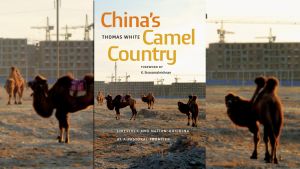CNPolitics: A Conversation with Fang Kecheng
We are happy to announce a new collaboration between the Made in China Journal and the website CNPolitics.org, a Chinese-language academic website specialising in the popularisation of social science research. In the coming months, CNPolitics will translate and feature a selection of our articles, making them available to a Chinese-speaking audience. In this conversation, CNPolitics founder Fang Kecheng, who is currently a PhD Candidate at the University of Pennsylvania, discusses the ideas and principles behind his initiative.
Kevin Lin: How did you start CNPolitics and what do you hope to achieve with this project?
Fang Kecheng: I started CNPolitics when I was a political journalist at the Southern Weekly (nanfang zhoumo). In the early autumn of 2011, our political editor came up with the idea that we should publish something new in addition to factual reporting. He suggested that we could have a special column called ‘Political Views’ (zhengjian, which later on became the Chinese name of CNPolitics), introducing findings from scholarly research on Chinese politics. Soon after he proposed this idea, however, he moved to another magazine. I volunteered to be in charge of this new column. How did I prepare for its launch? Very simple: by posting a call for contributors on Renren, a now-defunct Facebook-like social media platform. A few students studying in overseas universities joined and prepared the first group of articles. But the column never appeared in Southern Weekly, because the censors by then were too worried about introducing ‘Western academic research’ to a Chinese audience. They asked us to feature only studies by scholars who are ‘officially recognised’ by the Party-state. Disappointed by this decision, we started CNPolitics as an independent project. We built our own website, and set up accounts on major social media platforms including Weibo, WeChat, Zhihu, and Facebook. The reason why I did not give up this project was that I believe—as you do with the Made in China project—in the value of introducing academic studies to the general public. There is a wall between academia and the public, and it is very unfortunate that academic studies, which are often supported by taxpayers, are not accessible to a public audience. We want to tear down that wall and bring the intellectual resources to a wider readership.
KL: We all know that writing about social issues and politics in Chinese for a Chinese-language audience can be very sensitive. Has this been challenging for you?
FK: Of course, it is very challenging. We have articles that we never tried to publish. We avoid certain sensitive topics, and when editing I try to frame the articles in a less sensitive way, replacing certain words with ‘safer’ options. I rely on my own judgement, which is based on my journalistic experience in China. But we still make mistakes. On Christmas Day of 2015, our social media accounts were permanently deleted and our website was blocked in China. That was triggered by one sentence in an article on Syria: ‘Assad likes when people call him father, or Dada.’ We lost about 180,000 subscribers on WeChat, and about 80,000 followers on Weibo. Shortly after that, we launched our new accounts, but have not yet been able to reach the previous number of followers.
KL: How has CNPolitics evolved over the years in terms of form and content?
FK: We constantly experiment with new forms. We produced infographics from 2012 to 2014 and they were hugely popular. We also have podcasts, short videos, and webinars. In terms of content, we recently expanded our scope to include not only political science studies, but also other social science disciplines; and to focus not only Chinese politics and society, but also more global and comparative studies. This is partly due to the increasing censorship under Xi—it is no longer sustainable to focus solely on Chinese politics.
KL: Finally, where do you think CNPolitics will be heading in the next few years? Do you still see some space for this kind of website in the current media environment in China?
FK: CNPolitics is a volunteer-based project. Thus, we are limited in our capacity for expansion. In the current media environment, my best hope is for us to be able to continue to exist and provide content to the general public. We once discussed the possibility of turning CNPolitics into a commercial start-up project, but we found it very difficult due to the sensitivity of the topic and the fear that commercial interests would influence our content. The best-case scenario would have been for us to register as a non-profit organisation in China, but this is not possible under the strict new NGO regulations. Therefore, we will continue to run as a volunteer group. I do not mind if CNPolitics grows very slowly at the moment, as long as we are able to continue this project. The space for this kind of website is limited, not only because of political censorship, but also because of commercial competition. It is extremely difficult to get people’s attention in the current social media environment, particularly for operations such as ours with limited resources at our disposal. Ultimately, our goal is to continue reaching for a wider audience without compromising or distorting our content.





